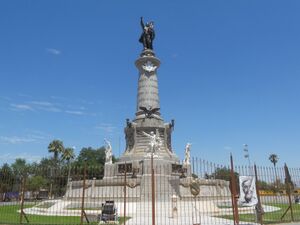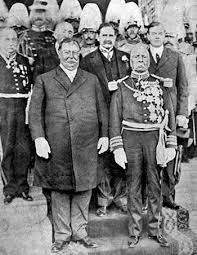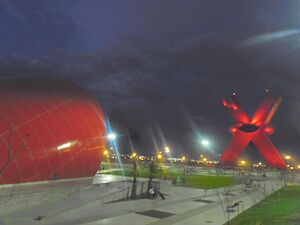سيوداد خواريز
سيوداد خواريز
Ciudad Juárez Juárez | |
|---|---|
 من أعلى لأسفل، من اليسار لليمين: Replica of the Triumphal Arch, Parque Central Poniente, Mormon Temple, Rio Bravo, Ciudad Juárez Cathedral, Acoustic shell in the Plaza de la Mexicanidad, and Panoramic view of El Paso, Texas (foreground) and Cd. Juárez (background). | |
| الكنية: El Paso del Norte ("الممر الشمالي") | |
| الشعار: Refugio de la libertad, custodia de la república (Spanish for "Refuge of liberty, guard of the republic") | |
 | |
| الإحداثيات: 31°44′42″N 106°29′06″W / 31.74500°N 106.48500°W | |
| البلد | المكسيك |
| State | Chihuahua |
| Municipality | Juárez |
| Foundation | 1659 |
| الحكومة | |
| • Municipal president | Cruz Pérez Cuéllar |
| المساحة | |
| • City | 321٫19 كم² (124٫01 ميل²) |
| المنسوب | 1٬137 m (3٬730 ft) |
| التعداد (2020)[2] | |
| • City | 1٬501٬551 |
| • الكثافة | 4٬113٫25/km2 (10٬653٫26/sq mi) |
| • العمرانية | 2٬539٬946[1] |
| • Demonym | Juarense |
| منطقة التوقيت | UTC-07:00 (MST) |
| • الصيف (التوقيت الصيفي) | UTC-06:00 (MDT) |
| مفتاح الهاتف | +52 656 |
| Climate | BWk |
| الموقع الإلكتروني | www |
سيوداد خواريز Ciudad Juárez أكبر مدينة مكسيكية على الحدود مع الولايات المتحدة. وتقع على نهر ريو گرانده، في مواجهة إل پاسو، تكساس. يبلغ عدد سكانها 1,217,818 نسمة.
إل پاسو وسيوداد خواريز معا تعتبران من أكبر المناطق الحضرية ثنائية القومية في العالم حيث يبلغ عدد سكانهما مجتمعتين نحو 2.5 مليون نسمة. كما أن سيوداد خواريز تعد واحدة من أسرع المدن نموا في العالم. فمثلا ذكرت نشرة صادرة عن البنك الاحتياطي الفيدرالي في دالاس حول سيوداد خواريز بأن "متوسط النمو السنوي خلال فترة 10 سنوات بين عامي 1990-2000 كان 5.3 في المائة. كما أن المدينة شهدت أعلى نسبة في النمو السكاني في ولاية تشيواوا والمكسيك بشكل عام.[3]
يقوم عدة آلاف من المدينة بعبور الحدود مع الولايات المتحدة ذهابا وإيابا يوميا، مما يجعلها نقطة الدخول الرئيسية لجميع وسائل النقل في وسط شمال المكسيك.
تعتبر المدينة مركزا هاما للصناعة والتي تشكل في جزء كبير منها لما يزيد عن 300 ماكيلادورا (منطقة حرة لتجهيز الصادرات، أو مصانع تجميع) الموجودة في المدينة وما حولها. ووفقا لما ذكرته صحيفة نيويورك تايمز في 2007 فان سيوداد خواريز قادرة "على استيعاب المزيد من العقارات الصناعية الجديدة أكثر من أي مدينة أخرى في أمريكا الشمالية."[4] وفي عام 2008 وصفت بأنها "مدينة المستقبل" من قبل مجلة "Foreign Direct Investment" التي تصدرها "فاينانشيال تايمز غروب".[5].
رغم هذا فإن المدينة هي أيضا مرتع لانتشار الفقر والعنف والجرائم، بما في ذلك سلسلة من جرائم الاعتداءات والقتل التي تعرضت لها إناث عمالات في المصانع. كما ولد العنف الذي تقوم به عصابات المخدرات بغرض السيطرة على طرق تهريب المخدرات نحو 6،000 قتيل في عام 2008. بينهم 1،600 منهم في خواريز وحدها، أي مايزيد عن ثلاث مرات أكثر من معظم المدن الأكثر عنفا في الولايات المتحدة.
ووفقا لمجلة أمريكا إكونوميا "América Economía" فان هذه المنطقة الحضرية الحدودية كانت دائما الحاصلة على المركز الأول بين أفضل المدن الكبرى للقيام بأعمال تجارية في أميركا اللاتينية.[6] كما أن "منطقة سيوداد خواريز - إل باسو" صنفت في المرتبة السادسة عشر في إحصائية تجارية لكبرى المناطق التجارية في الولايات المتحدة".[7]
. . . . . . . . . . . . . . . . . . . . . . . . . . . . . . . . . . . . . . . . . . . . . . . . . . . . . . . . . . . . . . . . . . . . . . . . . . . . . . . . . . . . . . . . . . . . . . . . . . . . . . . . . . . . . . . . . . . . . . . . . . . . . . . . . . . . . . . . . . . . . . . . . . . . . . . . . . . . . . . . . . . . . . . .
التاريخ
اسمها الرسمي هو سيوداد خواريز، وقد أُنشئت في عام 1662م باسم إل پاسو دل نورتي. أُعيدت تسميتها عام 1888، على اسم الرئيس بنيتو خواريز. وقد قامت الولايات المتحدة والمكسيك بتسوية نزاع الحدود بينهما عام 1963. ويرجع هذا النزاع إلى عام 1864، عندما غير نهر ريو جراندي مجراه واضعاً الأرض التي تتبع أصلاً إلى المكسيك، في الجانب الأمريكي من النهر. وقد أعادت الولايات المتحدة إلى خواريز، 355 هكتارًا من الأرض من ضمنها جزءً من إل پاسو. وحوّلت المكسيك، 78 هكتارًا من الأرض - بالقرب من إل باسو - للولايات المتحدة.
During the Mexican–American War, the Battle of El Bracito took place nearby on Christmas Day, 1846. The 1848 Treaty of Guadalupe Hidalgo established the Rio Grande as the border between Mexico and the United States. The main channel of the Rio Grande had moved southwestward leaving the settlements of Ysleta, Socorro, and San Elzeario on the Camino Real on the north bank of the river, isolated from the rest of the towns, in Texas.

Other settlements on the east bank of the Rio Grande were not part of a town at that time; as the U.S. Army set up its installations settlements grew around it. This would later become El Paso, Texas. From that time until around 1930, populations on both sides of the border moved freely across it.[citation needed]
In 1853, a new border adjustment occurred when the territory of La Mesilla was sold to the United States, with which the new border line after the Rio Grande began precisely in Paso del Norte, reinforcing its status as a border town.
During the French intervention in Mexico (1862–1867), Benito Juárez's republican forces stopped temporarily at El Paso del Norte before establishing his government-in-exile in Chihuahua. After 1882, the city grew, in large part, because of the arrival of the Mexican Central Railway. Commerce thrived in the city as more banks began operating, telegraph and telephone services became available, and trams appeared. These commercial activities were under the firm control of the city's oligarchy, which consisted of the Ochoa, Samaniego, Daguerre, Provencio, and Cuarón families. In 1888, El Paso del Norte was renamed in honor of Benito Juárez.
The city expanded significantly thanks to Díaz's free-trade policy, creating a new retail and service sector along the old Calle del Comercio (now Vicente Guerrero) and September 16 Avenue. A bullring opened in 1899. The Escobar brothers founded the city's first institution of higher education in 1906, the Escuela Particular de Agricultura. That same year, a series of public works are inaugurated, including the city's sewage and drainage system, as well as potable water. A public library, schools, new public market (the old Mercado Cuauhtémoc) and parks dotted the city, making it one of many Porfirian showcases.[مطلوب توضيح] Modern hotels and restaurants catered to the increased international railroad traffic from the 1880s on. However, national and foreign opposition to the "disloyal" commercial rivalry of the free zone was not long in coming and the Mexican government was forced to modify the status of the free zone in 1891. To this must be added the worldwide devaluation of silver and water scarcity, which generated a severe economic crisis in the city, causing a significant number of workers to flee to the United States. As a result of the collapse of commercial activities and population, Ciudad Juárez focused on tourism as an economic activity at the beginning of the 20th century, particularly promoting "diversions", thus beginning "the moment of scandal"[8]
In 1909, Díaz and William Howard Taft planned a summit in Ciudad Juárez and El Paso, a historic first meeting between a Mexican and a U.S. president, and also the first time a U.S. president would cross the border into Mexico.[9] But tensions rose on both sides of the border over the disputed Chamizal strip connecting Ciudad Juárez to El Paso, even though it would have been considered neutral territory with no flags present during the summit.[10] The Texas Rangers, 4,000 U.S. and Mexican troops, U.S. Secret Service agents, FBI agents and U.S. marshals were all called in to provide security.[11] Frederick Russell Burnham, the celebrated scout, was put in charge of a 250 private security detail hired by John Hays Hammond.[12][13] On October 16, the day of the summit, Burnham and Private C.R. Moore, a Texas Ranger, discovered a man holding a concealed palm pistol standing at the El Paso Chamber of Commerce building along the procession route.[14][15] Burnham and Moore captured, disarmed, and arrested the assassin within only a few feet of Díaz and Taft.[16][17]
The city was Mexico's largest border town by 1910—and as such, it held strategic importance during the Mexican Revolution. In May 1911, about 3,000 revolutionary fighters under the leadership of Francisco Madero laid siege to Ciudad Juárez, which was garrisoned by 500 regular Federal troops under the command of General Juan J Navarro. Navarro's force was supported by 300 civilian auxiliaries and local police. After two days of heavy fighting most of the city had fallen to the insurrectionists and the surviving federal soldiers had withdrawn to their barracks. Navarro then formally surrendered to Madero. The capture of a key border town at an early stage of the revolution not only enabled the revolutionary forces to bring in weapons and supplies from El Paso, but marked the beginning of the end for the demoralized Diaz regime.[18]
During the subsequent years of the conflict, Villa and other revolutionaries struggled for the control of the town (and income from the Federal Customs House), destroying much of the city during battles in 1911 and 1913. Much of the population abandoned the city between 1914 and 1917. Tourism, gambling, and light manufacturing drove the city's recovery from the 1920s until the 1940s. A series of mayors in the 1940s–1960s, like Carlos Villareal and René Mascareñas Miranda, ushered in a period of high growth and development predicated on the PRONAF border industrialization development program. A beautification program spruced up the city center, building a series of arched porticos around the main square, as well as neo-colonial façades for main public buildings such as the city health clinic, the central fire station, and city hall. The cathedral, built in the 1950s, gave the city center the flavor of central Mexico, with its carved towers and elegant dome, but structural problems required its remodeling in the 1970s. The city's population reached some 400,000 by 1970. In 1984, the city had a radiation incident after a private medical company illegally purchased a radiation therapy unit. It was dismantled, sold to a junkyard and later smelted to produce six thousand tons of rebar (which is used to reinforce buildings), exposing thousands to radiation.
Juárez has grown substantially in recent decades due to a large influx of people moving into the city in search of jobs with the maquiladoras. اعتبارا من 2014[تحديث] more technological firms have moved to the city, such as the Delphi Corporation Technical Center, the largest in the Western Hemisphere, which employs over 2,000 engineers. Large slum housing communities called colonias have become extensive.
Juárez has a long, notorious history of drug trafficking and the intense related violence.[19] Mexico's first homegrown cartel, run by Ignacia Jasso, was seated in the city, and for a time controlled much of the border drug trade.[20] Today the Juárez Cartel controls the routes in Juárez. Related violence in the city is responsible for more than 1000 unsolved murders of young women from 1993 to 2003.[بحاجة لمصدر]
Juárez is known for being a leading export city. International sales of Juárez in 2020 were US$54.9B, 13.7% more than the previous year. The products with the highest level of international sales in 2020 were Data Processing Machines and Data Processing Units, not elsewhere Specified or Included Elsewhere (US$22.8B), Electrical Wires and Cables (US$3.89B), and Instruments and Appliances Used in Medical Sciences (US$2.78B).[21] International purchases of Juárez in 2020 were US$48.3B, 16.7% more than the previous year. The products with the highest level of international purchases in 2020 were Electronic Integrated Circuits (US$9.96B), Parts and Accessories of Machines (US$8B), and Data Processing Machines and Data Processing Units, not elsewhere Specified or Included Elsewhere (US$4.51B).[21]
المناخ
| سيوداد خواريز | ||||||||||||||||||||||||||||||||||||||||||||||||||||||||||||
|---|---|---|---|---|---|---|---|---|---|---|---|---|---|---|---|---|---|---|---|---|---|---|---|---|---|---|---|---|---|---|---|---|---|---|---|---|---|---|---|---|---|---|---|---|---|---|---|---|---|---|---|---|---|---|---|---|---|---|---|---|
| جدول طقس (التفسير) | ||||||||||||||||||||||||||||||||||||||||||||||||||||||||||||
| ||||||||||||||||||||||||||||||||||||||||||||||||||||||||||||
| ||||||||||||||||||||||||||||||||||||||||||||||||||||||||||||
. . . . . . . . . . . . . . . . . . . . . . . . . . . . . . . . . . . . . . . . . . . . . . . . . . . . . . . . . . . . . . . . . . . . . . . . . . . . . . . . . . . . . . . . . . . . . . . . . . . . . . . . . . . . . . . . . . . . . . . . . . . . . . . . . . . . . . . . . . . . . . . . . . . . . . . . . . . . . . . . . . . . . . . .
الهامش
- ^ "The El Paso Regional Economic Development Corporation". سبتمبر 18, 2013. Archived from the original on سبتمبر 18, 2013.
- ^ "SCITEL". www.inegi.org.mx. Archived from the original on يناير 26, 2021. Retrieved يوليو 10, 2021.
- ^ http://www.dallasfed.org/research/busfront/bus0102.html
- ^ خطأ استشهاد: وسم
<ref>غير صحيح؛ لا نص تم توفيره للمراجع المسماةtwocities - ^ http://www.gdi-solutions.com/fdi/2007awards/Mexico/ciudad_juarez.htm
- ^ See “The Best Cities to Do Business in Latin America”, April 21, 2008, America Economía Magazine.
- ^ http://www.elpasoredco.com/Juarez-MaquilaIndustry.aspx
- ^ Flores Simental, Raúl (2017). Paso del norte en el siglo XXI : breve historia de Ciudad Juárez (in Spanish). Ciudad Juarez: Universidad Autónoma de Ciudad Juárez.
{{cite book}}: CS1 maint: unrecognized language (link) - ^ Harris 2009, p. 1.
- ^ Harris 2009, p. 14.
- ^ Harris 2009, p. 15.
- ^ Hampton 1910.
- ^ van Wyk 2003, pp. 440–446.
- ^ Harris 2009, p. 16.
- ^ Hammond 1935, pp. 565-66.
- ^ Harris 2009, p. 213.
- ^ Harris 2004, p. 26.
- ^ Aitkin, Ronald (1969). Mexico 1910-20. Macmillan & Co. pp. 85–90.
- ^ "Human heads sent to Mexico police" Archived يوليو 28, 2011 at the Wayback Machine, BBC News, October 21, 2008. Accessed March 5, 2009
- ^ Duhaime, Christine (يناير 7, 2021). "Queen of the North: the forgotten story of how a woman more dangerous than Lucky Luciano, ran the first Mexican drug cartel for 50 years". Anti Money Laundering Law in Canada (in الإنجليزية الأمريكية). Archived from the original on يوليو 9, 2021. Retrieved يوليو 1, 2021.
- ^ أ ب "Juárez: Economy, employment, equity, quality of life, education, health and public safety". Data México. Archived from the original on فبراير 13, 2023. Retrieved مارس 5, 2023.
وصلات خارجية
- Pages using gadget WikiMiniAtlas
- CS1 الإنجليزية الأمريكية-language sources (en-us)
- Articles with hatnote templates targeting a nonexistent page
- Missing redirects
- Use mdy dates from July 2017
- Short description is different from Wikidata
- Articles containing إسپانية-language text
- Pages using infobox settlement with possible motto list
- Coordinates on Wikidata
- Articles with unsourced statements from February 2020
- جميع الصفحات التي تحتاج تنظيف
- مقالات بالمعرفة تحتاج توضيح from September 2013
- مقالات فيها عبارات متقادمة منذ 2014
- جميع المقالات التي فيها عبارات متقادمة
- Articles with unsourced statements from October 2021
- Cities, towns and villages in Chihuahua
- سيوداد خواريز
- 1659 establishments in New Spain
- معابر الحدود الأمريكية-المكسيكية
- أماكن مأهولة تأسست في 1659
- حرب المدن
- بلدات الحدود الأمريكية-المكسيكية
- Camino Real de Tierra Adentro
- صفحات مع الخرائط







